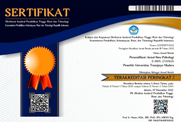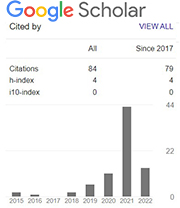Pengaruh Fanatisme, Self-control, dan Religiusitas terhadap Perilaku Agresi Verbal pada Mahasiswa Penggemar K-Pop di Kota Bandung
Abstract
Keywords
Full Text:
PDF (Bahasa Indonesia)References
Abdullah, D. I. M. A., Hayati, S., & Gismin, S. S. (2021). Pengaruh self-control terhadap aggressive verbal pada mahasiswa di media sosial. Jurnal Psikologi Karakter, 1(2), Article 2. https://doi.org/10.56326/jpk.v1i2.1228
Afandi, A. R., & Hartati, S. (2019). Pembelian impulsif pada remaja akhir ditinjau dari kontrol diri. Gadjah Mada Journal of Psychology (GamaJoP), 3(3), 123. https://doi.org/10.22146/gamajop.44103
Ardis, N., & Khumas, A. (2021). Fenomena fanwar remaja perempuan penggemar k-pop di media sosial terindikasi akibat perilaku fanatik. Jurnal Psikologi, 4(1), 8. https://doi.org/10.31293/mv.v4i1.5447
Aridhona, J., & Setia, R. D. (2022). Perilaku agresi verbal pada remaja. Psikovidya, 26(1), 11–15. https://doi.org/10.37303/psikovidya.v26i1.196
Baumeister, R. F., Vohs, K. D., & Tice, D. M. (2007). The strength model of self-control. Current Directions in Psychological Science, 16(6), 351–355. https://doi.org/10.1111/j.1467-8721.2007.00534.x
Bykov, I. A., Balakhonskaya, L. V., Gladchenko, I. A., & Balakhonsky, V. V. (2018). Verbal aggression as a communication strategy in digital society. 2018 IEEE Communication Strategies in Digital Society Workshop (ComSDS), 12–14. https://doi.org/10.1109/COMSDS.2018.8354954
Cohen, A. B., Pierce, J. D., Chambers, J., Meade, R., Gorvine, B. J., & Koenig, H. G. (2005). Intrinsic and extrinsic religiosity, belief in the afterlife, death anxiety, and life satisfaction in young Catholics and Protestants. Journal of Research in Personality, 39(3), 307–324. https://doi.org/10.1016/j.jrp.2004.02.005
Eden, J., & Roberto, A. J. (2021). The role of verbal aggression in cyberbullying perpetration and victimization by middle school students. Future Internet, 13(9), 223. https://doi.org/10.3390/fi13090223
Eker, E., & Akdeni̇Z, B. (2022). Examination of separation-individuation characteristics on the relationship between fanaticism and agression in young adults. OPUS Toplum Araştırmaları Dergisi, 19(48), 603–616. https://doi.org/10.26466/opusjsr.1107721
El Hafiz, S., & Aditya, Y. (2021). Kajian literatur sistematis penelitian religiusitas di indonesia: istilah, definisi, pengukuran, hasil kajian, serta rekomendasi. Indonesian Journal for The Psychology of Religion, 1(1). https://doi.org/10.24854/ijpr428
Eliani, J., Yuniardi, M. S., & Masturah, A. N. (2018). Fanatisme dan perilaku agresif verbal di media sosial pada penggemar idola k-pop. Psikohumaniora: Jurnal Penelitian Psikologi, 3(1), 59. https://doi.org/10.21580/pjpp.v3i1.2442
Fibrianto, A. S., Asrori, M. I., Mahardiansyah, D., Anggraini, L. M., Lailani, A. T. U., Azizah, S. N., & Trianjaya, A. (2020). Analysis of globalization phenomena: Forms of k-pop cultural fanaticism among students (case study of sociology student at universitas negeri malang). 318–323. https://doi.org/10.2991/assehr.k.200214.058
Fitriani, A. (2016). Peran religiusitas dalam meningkatkan psychological well being. Al-Adyan, 11(1), 57–80. http://dx.doi.org/10.24042/ajsla.v11i1.1437
Ghozali, I. (2011). Aplikasi analisis multivariate dengan program SPSS (Ed. 4). Badan Penerbit Universitas Diponegoro.
Goddard H. (2001). Civil religion. Cambridge University Press.
Hayati, S. D. Y., Prabowo, A., & Hijrianti, U. R. (2022). Kebijaksanaan (wisdom) dan fanatisme pada penggemar k-pop. Cognicia, 10(1), 42–50. https://doi.org/10.22219/cognicia.v10i1.20089
Huber, S., & Huber, O. W. (2012). The Centrality of Religiosity Scale (CRS). Religions, 3(3), 710–724. https://doi.org/10.3390/rel3030710
Indriani, N., & Kusuma, R. S. (2022). Interaksi sosial fandom army di media sosial weverse. Jurnal Komunikasi Global, 11(2), 206–226. https://doi.org/10.24815/jkg.v11i2.25397
Infante, D. A., & Wigley, C. J. (1986). Verbal aggressiveness: An interpersonal model and measure. Communication Monographs, 53(1), 61–69. https://doi.org/10.1080/03637758609376126
Javier, F. (2021, Agustus 5). Ada 7,5 miliar twit k-pop pada juli 2020-juni 2021, terbanyak dari indonesia. Data Tempo.co. https://data.tempo.co/data/1174/ada-75-miliar-twit-k-pop-pada-juli-2020-juni-2021-terbanyak-dari-indonesia
Jeong, J.-S., Lee, S.-H., & Lee, S.-G. (2017). When indonesians routinely consume korean pop culture: revisiting jakartan fans of korean drama dae jang geum. International Journal of Communication, 11. https://consensus.app/papers/wave-when-indonesians-routinely-culture-revisiting-jeong/9077811557355c21940ab5987882a7d8/
Ji, C.-H., & Ibrahim, Y. (2007). Islamic religiosity in right-wing authoritarian personality: the case of indonesian muslims. Review of Religious Research, 49(2), 128–146.
Jung, S. (2011). K-pop, Indonesian fandom, and social media. Transformative Works and Cultures, 8. https://doi.org/10.3983/twc.2011.0289
Jung, S., & Shim, D. (2014). Social distribution: K-pop fan practices in Indonesia and the ‘Gangnam Style’ phenomenon. International Journal of Cultural Studies, 17(5), 485–501. https://doi.org/10.1177/1367877913505173
Kosasih, A. V. N. A., Sarbini, S., & Mulyana, A. (2021). Leisure boredom dan religiusitas: pengaruhnya terhadap kecenderungan adiksi internet. Psympathic : Jurnal Ilmiah Psikologi, 8(1), 47–56. https://doi.org/10.15575/psy.v8i1.12352
Kurniawan, A. (2020). Pengaruh fanatisme dan kontrol diri terhadap agresi verbal pada pendukung calon presiden dan wakil presiden 2019 di kota Malang. Universitas Islam Negeri Syarif Hidayatullah.
Landau, S. F., Björkqvist, K., Lagerspetz, K. M. J., Österman, K., & Gideon, L. (2002). The effect of religiosity and ethnic origin on direct and indirect aggression among males and females: Some Israeli findings. Aggressive Behavior, 28(4), 281–298. https://doi.org/10.1002/ab.80006
Mohd Yusoff, M. Z., Safrilsyah, S., Haji Othman, M. K., Fajri, I., Yusuf, S. M., Ibrahim, I., & Mohd Zain, W. H. W. (2022). The effect of moral reasoning and values as the mediator towards student’s prosocial behaviour. International Journal of Adolescence and Youth, 27(1), 32–44. https://doi.org/10.1080/02673843.2021.2021959
Mubarak, A. (2018). Aggression and digression in the thirdpresidential debate between hillary clinton and donald trump. International Journal of Advanced Research, 6(2), 28–36. https://doi.org/10.21474/IJAR01/6404
Natingkaseh, G. N, Utami, A. B., & Ramadhani, H. S. (2022). Kecenderungan melakukan agresivitas verbal pada remaja perempuan: Menguji peranan kontrol diri. Inner: Journal of Psychological Research, 2(2), 123–130.
Nęcka, E. (2015). Self-Control Scale AS-36: Construction and validation study. Polish Psychological Bulletin, 46(3), 488–497. https://doi.org/10.1515/ppb-2015-0055
Nuril Hidayah. (2022). Membangun budaya kolaborasi digital melalui fandom: Kasus indonesian dears with love. Jurnal Riset Jurnalistik dan Media Digital, 141–150. https://doi.org/10.29313/jrjmd.v2i2.1370
Putri, I. P., Liany, F. D. P., & Nuraeni, R. (2019). K-Drama dan penyebaran korean wave di Indonesia. ProTVF, 3(1), 68. https://doi.org/10.24198/ptvf.v3i1.20940
Rinata, A. R., & Dewi, S. I. (2019). Fanatisme penggemar kpop dalam bermedia sosial di instagram. Interaksi: Jurnal Ilmu Komunikasi, 8(2), 13. https://doi.org/10.14710/interaksi.8.2.13-21
Santrock, J. W. (2011). Life-span development (13th ed). McGraw-Hill Higher Education.
Savin, N. E., & White, K. J. (1977). The durbin-watson test for serial correlation with extreme sample sizes or many regressors. Econometrica, 45(8), 1989. https://doi.org/10.2307/1914122
Sihombing, S. O. (2018). Youth perceptions toward corruption and integrity: Indonesian context. Kasetsart Journal of Social Sciences, 39(2), 299–304. https://doi.org/10.1016/j.kjss.2018.03.004
Tangney, J. P., Baumeister, R. F., & Boone, A. L. (2004). High self‐control predicts good adjustment, less pathology, better grades, and interpersonal success. Journal of Personality, 72(2), 271–324. https://doi.org/10.1111/j.0022-3506.2004.00263.x
Utami, L. S. S., & Winduwati, S. (2020). Fandom and voluntary “army”: Case study on BTS fans in Indonesia: The 2nd Tarumanagara International Conference on the applications of social sciences and humanities (ticash 2020), Jakarta Barat, Indonesia. https://doi.org/10.2991/assehr.k.201209.105
Watiningsih, E. D. (2020). Pengaruh fanatisme, anonimitas dan trait kepribadian big five terhadap agresi verbal penggemar k-pop di media sosial [Fakultas Psikologi UIN Syarif Hidayatullah Jakarta]. https://repository.uinjkt.ac.id/dspace/handle/123456789/53734
Wijaya, E. F., Aditya, Y., & Matahari, D. (2018). Hubungan antara religiositas dengan agresivitas pada komunitas pemuda gereja. Jurnal Psikologi Ulayat, 5(1), Article 1. https://doi.org/10.24854/jpu12018-128
Yilmaz, K. (2013). Comparison of quantitative and qualitative research traditions: epistemological, theoretical, and methodological differences: European Journal of Education. European Journal of Education, 48(2), 311–325. https://doi.org/10.1111/ejed.12014
Ysseldyk, R., Matheson, K., & Anisman, H. (2011). Coping with identity threat: The role of religious orientation and implications for emotions and action intentions. Psychology of Religion and Spirituality, 3(2), 132–148. https://doi.org/10.1037/a0021599
Yun Hoong, T., Pakirnathan, P. G., & Hong Ling, I. L. (2020). The effect of media violence on the verbal aggressive behaviours of malaysian chinese independent secondary school students. e-Academia Journal, 9(1). https://doi.org/10.24191/e-aj.v9i1.9523
Zuhirsyan, M., & Nurlinda, N. (2021). Pengaruh religiusitas, persepsi dan motivasi nasabah terhadap keputusan memilih perbankan syariah. JPS (Jurnal Perbankan Syariah), 2(2), 114–130. https://doi.org/10.46367/jps.v2i2.342
DOI: https://doi.org/10.21107/personifikasi.v14i2.21974
Refbacks
- There are currently no refbacks.
Copyright (c) 2023 Muhamad Anshori

This work is licensed under a Creative Commons Attribution 4.0 International License.


Personifikasi by Universitas Trunojoyo Madura is licensed under a Creative Commons Attribution 4.0 International License.










